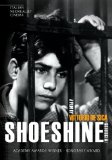| Reviews & Columns |
|
Reviews DVD TV on DVD Blu-ray 4K UHD International DVDs In Theaters Reviews by Studio Video Games Features Collector Series DVDs Easter Egg Database Interviews DVD Talk Radio Feature Articles Columns Anime Talk DVD Savant Horror DVDs The M.O.D. Squad Art House HD Talk Silent DVD
|
DVD Talk Forum |
|
|
| Resources |
|
DVD Price Search Customer Service #'s RCE Info Links |
|
Columns
|
|
|
Shoeshine
THE MOVIE:
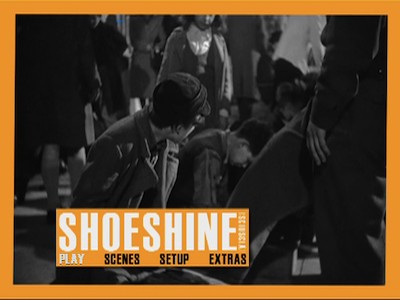
Two years before he made his most famous film, The Bicycle Thieves, the maestro of Neorealism and melodrama, Vittorio De Sica, made another film about struggles in post-War Italy and the hard moral choices facing the poverty-stricken citizenry. Titled Shoeshine, it tells the tale of two boys, best friends who live in the streets and make their living by shining shoes, including those of occupying American soldiers. It's a blistering portrayal of a critical period of time, created in the midst of it, and yet tapping into something fundamentally human, and thus still effective even decades later.
Young Pasquale (Franco Interlenghi) is an orphan, and having to live by his wits has made him the smarter of the two cohorts. His pal is Giuseppe (Rinaldo Smordoni), a cute kid, likable--Giuseppe regularly charms chocolate out of soldiers and even has a little girlfriend (Anna Pedoni). He also has an older brother. It's this sibling that gives the boys the job of selling two blankets stolen off the Americans. The boys take the job because they are saving up to purchase a horse together. When the sale turns out to be part of a bigger con to rob the buyer, they think their prayers are answered; unfortunately, the old woman, a fortuneteller, identifies the two youngsters and they are sent to jail.
The bulk of Shoeshine takes place behind bars, where the boys have their friendship tested. De Sica shows the juvenile detention system as a rough social order. The cells are overcrowded, five kids to a room, with each enclave becoming its own little gang. Giuseppe ends up under the tutelage of Arcangeli (Bruno Ortenzi), who it's rumored robbed a bank with a machine gun. Given that he's a doctor's son, the truth is probably a lot softer, but the teenager is hardened to prison life and knows his way around trading cigarettes and fighting in the showers. In a classical story sense, Arcangeli is at war with Pasquale over possession of Giuseppe. His immortal soul may not be at stake, but his allegiance is. Trust is a big thing in the hoosegow, and if you lose your comrade's loyalty, it could mean death.
Shoeshine was made in 1946, when Vittorio De Sica was fully ensconced in the Neorealist movement. A cinema school born out of harsh necessity and political fervor, Neorealism used the resources at hand to as closely as possible show life as it was. Anchise Brizzi's black-and-white photography manages to make the brick walls and barren floors of the boy's prison look beautiful, almost romantic. It's an underworld unto itself, a kind of hell on Earth. All sorts of drama goes on within the prison walls, as well as all kinds of human torture and degradation. Bad food, cold showers, hard beds--these are all ways that the inmates suffer. Though, as in most societies, the harshest punishments are what the people living within it inflict on one another. The mind games played by convict and guard alike are what do the boys' heads in; the bare-knuckled fighting is probably a relief by comparison.
De Sica directs his two young actors well, bringing out fine, emotional performances. Both boys have real personality on screen, and their early friendship is as believable as their eventual falling out. There is also quite a bit of commentary on the state of the Italian legal system. Most of it is presented without too much embellishment, the story speaks for itself, but by the time the little crooks go to trial, De Sica really ratchets up the rhetoric. Giuseppe's lawyer pretty much turns to the audience and points his finger. He blames society for abandoning its youth. Every citizen and politician is as guilty of the children's crimes as they are. Given the prior evidence, it's hard to say he's wrong, but the director didn't need to put such a fine point on it.
That said, despite the heaviness of the greater themes and the stark setting, there is also plenty of humor in Shoeshine. The boys all joke around as a means of coping, and some of their antics can be quite funny. The movie also has a whole lot of heart. The relationships presented here are genuine, and this lends a lot of weight to the melodramatic climax. The final shots of the film are simple and poetic, evoking a strong reaction with the viewer. Shoeshine has a cumulative impact that comes to bear in those last moments, creating a lasting impression that is at least equal to the memorable finales of the more well-known De Sica films, like the aforementioned Bicycle Thieves and 1952's Umberto D. It's also as insightful a portrait of a defeated nation as Seijun Suzuki's post-war films about occupied Japan (Gate of Flesh, Story of a Prostitute), but unlike Suzuki, bartering more in empathy than anger. This gives Shoeshine a lasting power. Plus, Shoeshine is a crucial early step toward the Italian director's influential later films, and thus a must-see for all cinema fans.
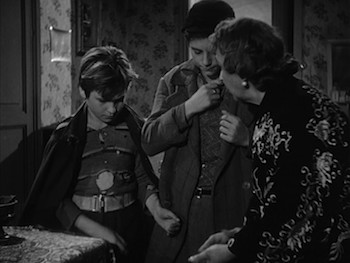
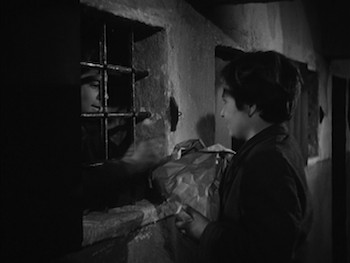
THE DVD
Video:
The full frame, 1.33:1 image transfer on Shoeshine is pretty good. Despite some edge enhancement and some digital spotting here and there, the overall quality is strong, with a clear picture and very little by way of scratching or other damage to the print. Values of the darks and lights are also very good.
Sound:
Shoeshine's original Italian soundtrack is mixed in mono. The basic sound quality is clear and evenly toned; there is some faint echo and/or hiss at times, but it's not too obtrusive. The optional English subtitles are in yellow and easy to read, though there is the occasional annoying typo.
Extras:
Author Bert Cardullo has recorded a full-length audio commentary for the feature. The track is detailed and scholarly, exploring the historical significance of the film, dissecting the technique, and analyzing the meaning.
A theatrical trailer is also included.
FINAL THOUGHTS:
Highly Recommended. It's a pleasure to finally have Vittorio De Sica's 1946 film Shoeshine on DVD on this side of the Atlantic. The story of two boys struggling to get by in post-war Italy ends up being a critical assessment of societal failures and the harsh world of juvenile detention facilities. Shoeshine is a Neorealist classic, blending honest commentary with equally honest emotions to create a moving and meaningful narrative. The technique is as important as the story itself, but De Sica is so good, the famous aesthetics all but disappear in the telling.
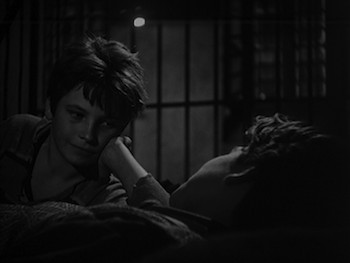
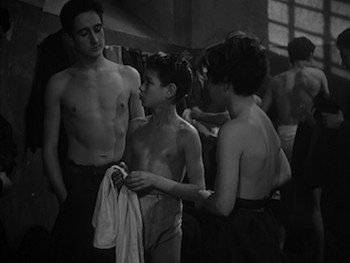
Jamie S. Rich is a novelist and comic book writer. He is best known for his collaborations with Joelle Jones, including the hardboiled crime comic book You Have Killed Me, the challenging romance 12 Reasons Why I Love Her, and the 2007 prose novel Have You Seen the Horizon Lately?, for which Jones did the cover. All three were published by Oni Press. His most recent projects include the futuristic romance A Boy and a Girl with Natalie Nourigat; Archer Coe and the Thousand Natural Shocks, a loopy crime tale drawn by Dan Christensen; and the horror miniseries Madame Frankenstein, a collaboration with Megan Levens. Follow Rich's blog at Confessions123.com.
|
| Popular Reviews |
| Sponsored Links |
|
|
| Sponsored Links |
|
|
| Release List | Reviews | Shop | Newsletter | Forum | DVD Giveaways | Blu-Ray | Advertise |
|
Copyright 2024 DVDTalk.com All Rights Reserved. Legal Info, Privacy Policy, Terms of Use,
Manage Preferences,
Your Privacy Choices | |||||||









